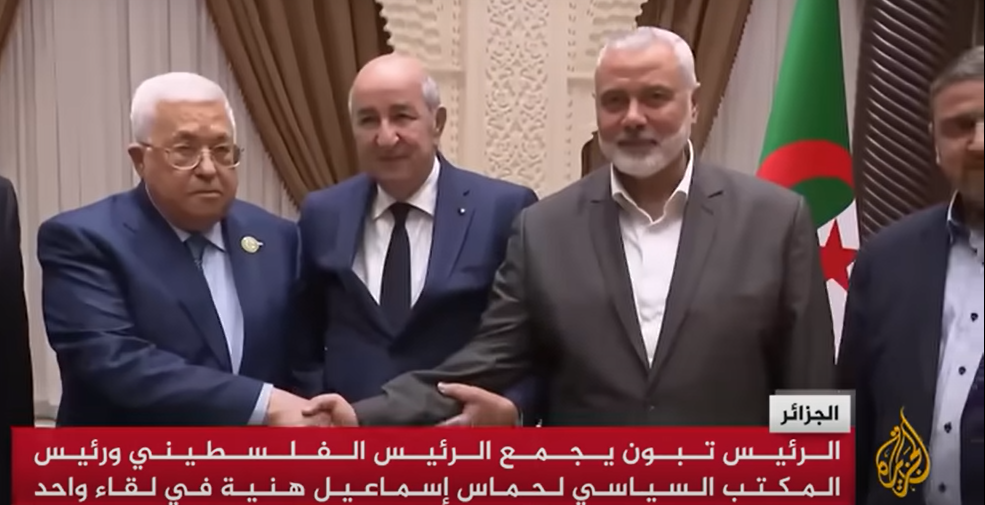The incident at the Jenin refugee camp, where senior members of the Fatah movement were humiliated while attending the funerals of terrorists killed by the IDF, deeply shocked Mahmoud Abbas and his leadership.
Mahmoud al-Aloul, Azzam al-Ahmed, and Tawfik Al-Tirawi were disgracefully expelled from the camp, with the crowd chanting insults at them, referring to them as “traitors” and “spies of Israel.”
The three individuals claim that Hamas activists were responsible for their expulsion, which further strained relations between the PA and Hamas.
Palestinian intelligence informed Abbas that Hamas was exploiting the events in the Jenin refugee camp to destabilize the Palestinian Authority’s rule. As a result, attacks against settlers were intensified to complicate the PA’s relationship with Israel.
The Palestinian people have fallen for Hamas’ incitement, making the PA and its leader the most despised figures in the eyes of West Bank residents.
They are seen as collaborators with the Israeli security system against armed groups. Anger on the Palestinian streets is soaring, and Mahmoud Abbas, along with his inner circle in the PA, is deeply concerned about these recent developments.
In light of this predicament, the PA chairman has ordered Fatah’s armed groups in Judea and Samaria to demonstrate their strength on the streets of major cities as a deterrent to Hamas and anyone seeking to destabilize the PA.
Hundreds of armed terrorists from the Fatah movement’s “Al-Aqsa Martyrs Brigades” held military parades in several cities, firing shots into the air. In some instances, they issued threats to those daring to challenge the PA.
PA sources suggest that Mahmoud Abbas has coordinated with Israel to deploy the PA’s security forces in Jenin and its refugee camp, capitalizing on the IDF’s achievements in the area.
However, sources from Islamic Jihad and Hamas state that they will not allow the PA to enter the Jenin refugee camp.
Over the past two years, with weapons and funding from Iran, Islamic Jihad has gained control over northern Samaria through its established “battalions.” Hamas’ popularity has increased on the Palestinian streets following attacks by its military wing against settlements such as Eli, Kdumim, and Ramat Hachayal in Tel Aviv.
The PA is viewed as weak and facing financial bankruptcy. Even if Israel provides economic support, it will not improve the PA’s standing among the Palestinian people.
A senior official in the Fatah movement believes that the movement has fulfilled its historical role due to Mahmoud Abbas’ policies, corruption, and leniency towards armed terrorist groups.
Mahmoud Abbas, who commands around 30,000 armed men receiving salaries from him and loyal to his command, realizes that his policies have engendered internal strife.
Most of these armed personnel sympathize with the armed terrorist groups. Abbas knows this well and fears that ordering them to fight against these groups could lead to a civil war, leaving a stain on his legacy.
Hamas officials claim that the weapons held by their activists in Judea and Samaria will be deployed against the PA as soon as Mahmoud Abbas steps down from the political stage.
Hamas patiently awaits the opportunity and has no intention of allowing Fatah’s senior members, who are engaged in a succession battle, to divide power between them. Hamas seeks a significant share.
The considerable tension between PA Chairman Mahmoud Abbas and the residents of the Jenin refugee camp, along with Hamas and Islamic Jihad, deeply worries Abbas.
He is striving to reconcile with the camp’s residents and factions that oppose his policies.
A senior delegation of Fatah officials visited the Jenin refugee camp to pursue reconciliation with the armed groups.
Simultaneously, Abbas is initiating a reconciliation meeting in Cairo, inviting all Palestinian factions, to restore national unity and downplay the humiliation suffered by senior Fatah members in Jenin.
Mahmoud Abbas has sent Fatah Secretary General Jibril Rajoub to Turkey, where he met with Saleh al-Arouri, the head of Hamas’ military wing in Judea and Samaria, to persuade him to send representatives to the Cairo meeting.
However, at present, the leadership of Hamas and Islamic Jihad refuses to participate in the Cairo meeting, perceiving it as an attempt to grant renewed legitimacy to the PA following the tumultuous events in the Jenin refugee camp.
Hamas officials argue that the meeting holds no value as long as the PA continues its security coordination with Israel and remains complicit in executing the Israeli Shin Bet’s policies.
Recently, the Palestinian Authority’s security forces demonstrated significant violence against Hamas activists during student council elections at Bir Zeit and Al-Najah universities in Nablus.
Hamas remains mindful of the oppression and arrests carried out by the PA against its activists.
A previous reconciliation meeting was held in 2020 via video conference, involving 14 Palestinian factions, including Hamas and Islamic Jihad.
This meeting aimed to prepare for President Trump’s “Deal of the Century” plan. However, the deep tensions and fierce rivalry between the PA and Hamas hinder genuine reconciliation.
The ground is rapidly shifting beneath the PA’s feet, and fears arise of internal protests and armed clashes between factions in the Palestinian cities of Judea and Samaria.
The PA Chairman is preparing for the worst-case scenarios, but he also relies on Israel’s intervention to prevent Hamas and Islamic Jihad from toppling his rule.




